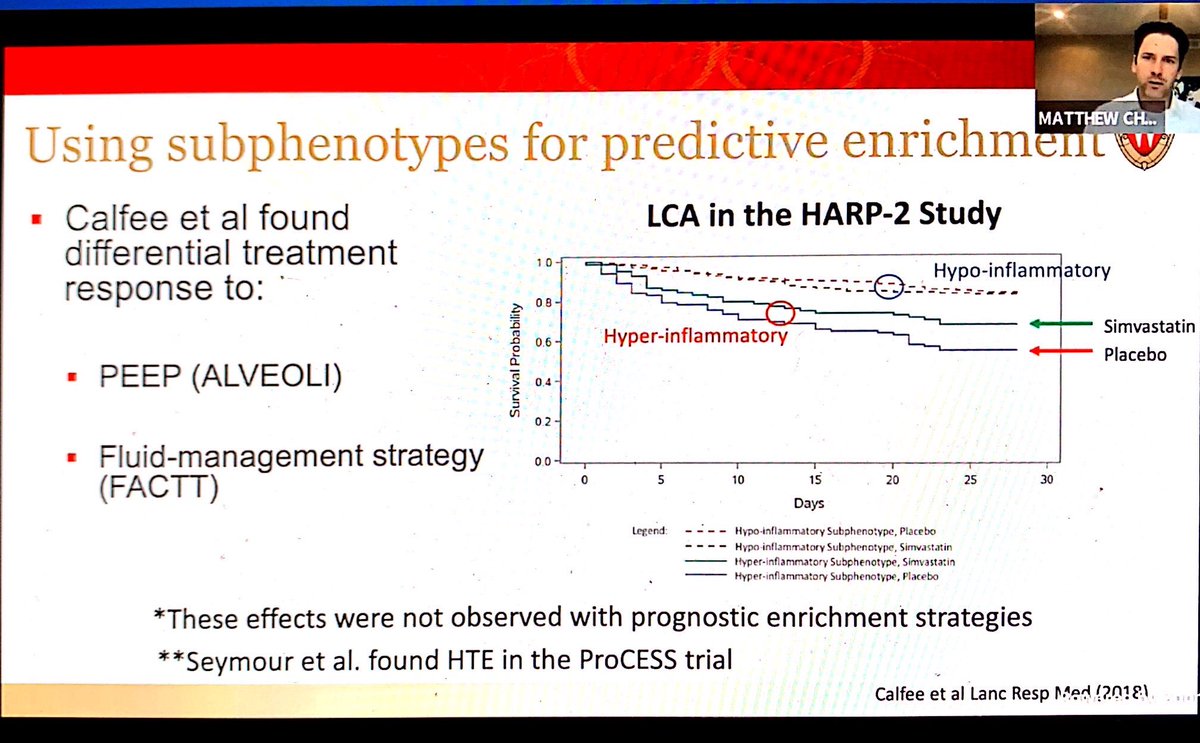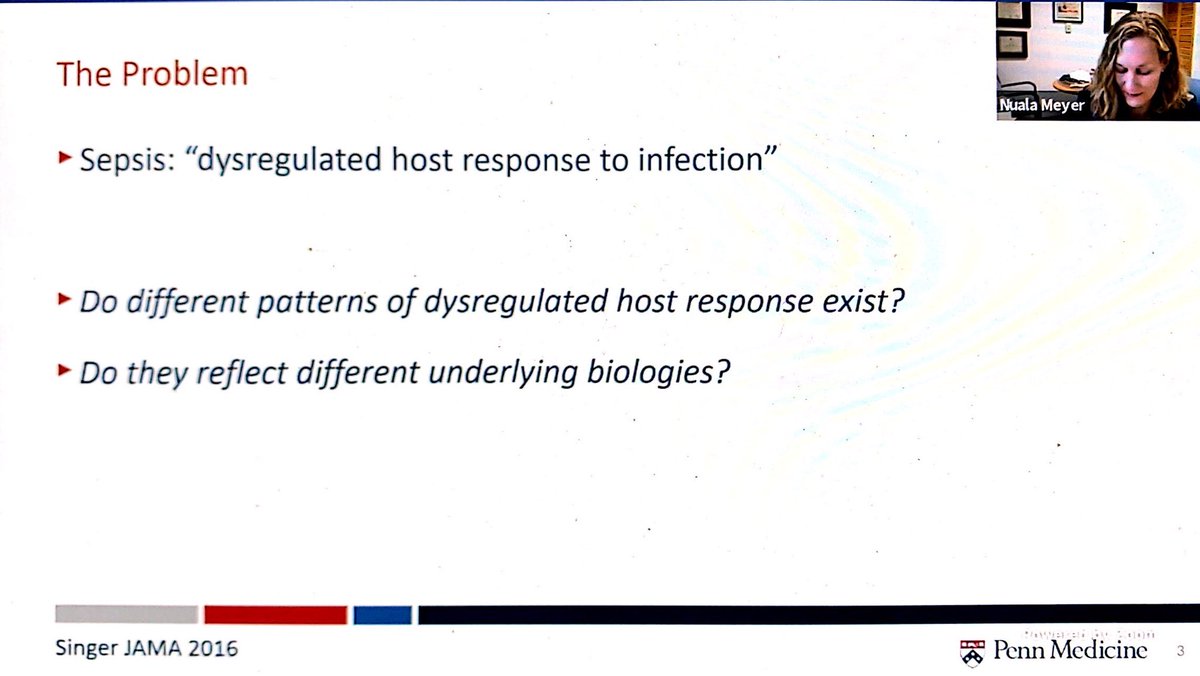
Next I'll be tweeting on "Sepsis Phenotypes: The Path to Personalization"! #CHEST2020
The first presenter is Dr. Churpek with "Sepsis Phenotypes: What Are They and How Could They be Useful?" #CHEST2020
What is a phenotype? #CHEST2020 

Sepsis is a heterogenous syndrome. #CHEST2020 

How can subphenotypes be identified? #CHEST2020 

How could subphenotypes be useful? #CHEST2020 

Published subphenotypes have been found to be prognostic. #CHEST2020 



But lactate is also prognostic. Prognostication should not be the primary metric of successful phenotyping. #CHEST2020 

Using subphenotypes to understand mechanisms! Temperature trajectories correlate with immune response. #CHEST2020 

We can also use subphenotypes for predictive enrichment! #CHEST2020 

Now people are looking at combining prognostic and predictive enrichment. #CHEST2020 

The future of sepsis phenotypes will involve increased focus on predicting individual treatment effects. #CHEST2020 

Conclusions #CHEST2020 

The next session is "Identifying Phenotypes Using Pre-Admission Patient Characteristics and Trajectories" with Dr. Erin Carlton! #CHEST2020 

I didn't catch all of the great info on pediatric sepsis, unfortunately, but it's available on demand! #CHEST2020
This study looked at whether a patient's path into sepsis influences their outcome. #CHEST2020 

They found that there were at least three different archetypal paths leading into sepsis. #CHEST2020 

It does seem that these paths were useful in predicting mortality. #CHEST2020 



Future questions #CHEST2020 

Conclusions #CHEST2020 

The next session is "Novel Molecular In-Hospital Phenotypes" with Dr. Nuala Meyer! #CHEST2020 

The problem #CHEST2020 

Finding relevant biologic subgroups in sepsis: There are both knowledge-based and data driven approaches. #CHEST2020 

This study used a genetic approach and found a lower ARDS risk and a gene that encodes IL1RA. #CHEST2020 

There was no mortality benefit of recombinant human IL-1 receptor antagonist in patients with sepsis. #CHEST2020 

This study looked at whether the mortality effect was modified by IL1RA levels, and it was. #CHEST2020 

Some people are looking at transcriptomics at the mRNA from WBCs. Gene expression is dynamic and changes with time. #CHEST2020 

This group has found two clusters of patients with sepsis. SRS1 consistently has a higher mortality. #CHEST2020 

Patients in the SRS2 group actually responded worse to steroids. #CHEST2020 

This study looked at lymphocyte populations in COVID-19. They found 3 immunotypes. #CHEST2020 



We need to find traits that are clinically relevant, identifiable/measurable, and TREATABLE. #CHEST2020 

Future directions #CHEST2020 

The next session is "Applying Phenotypes to Personalize Sepsis Care" with Dr. Robyn Scatena! #CHEST2020 

The future state of using precision medicine for sepsis will hopefully allow early diagnosis, identifying appropriate antibiotics, predicting outcomes, informing adjunctive therapy use, and more! #CHEST2020 

The current state is using the sepsis phenotype/endotype to emphasize aspects of care and to risk stratify, but the basic care algorithm is unchanged. #CHEST2020 

We should consider how these aspects might be modified by understanding sepsis phenotypes. #CHEST2020 

For the most part we will continue to use the tools we have (Q-SOFA and SIRS) for early identification of sepsis. #CHEST2020 

We may be able to use phenotypes to help identify people at high risk for early identification. #CHEST2020 

We may be able to use phenotypic data to identify patients at an increased risk of mortality who we may want to treat with early antibiotics even if there is a low likelihood of bacterial infection. #CHEST2020 

We can use phenotypic data to identify patients with an increased risk of mortality or a complicated course who we may want to admit to a higher level of care. #CHEST2020 

The phenotypic data that accumulates during a patient's hospital stay may inform prognosis and goals of care discussions with patients and families. #CHEST2020 

Temperature trajectories are also associated with distinct patient features in COVID-19. #CHEST2020 

Phenotypic data may also be helpful for considering who to use adjunctive therapies in (like corticosteroids). #CHEST2020 

Did the APPROCHS find a mortality benefit because it was enriched for SRS1? Also, are patients at increased risk for sepsis mortality more likely to have phenotype SRS1? Might these be patients in whom to use corticosteroids? #CHEST2020 

Thank you to all of our brilliant presenters! #CHEST2020
• • •
Missing some Tweet in this thread? You can try to
force a refresh










